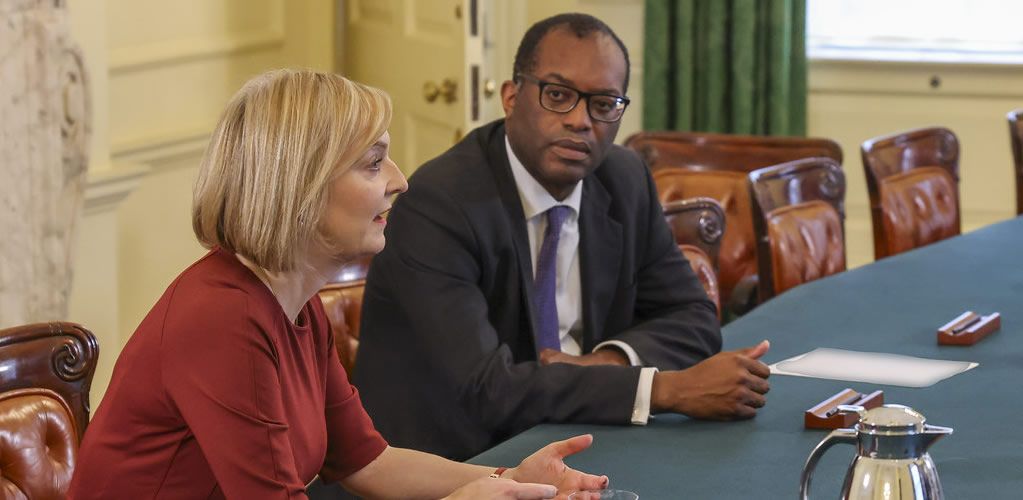Kamikwasi, Librium Liz and the great British joke factory
Liz Truss and her Chancellor Kwasi Kwarteng are becoming so absurd about their economic plans for Britain as to be beyond satire.

Liz Truss and her Chancellor Kwasi Kwarteng are becoming so absurd about their economic plans for Britain as to be beyond satire.
First published: Oct 2022.
The British joke factory runs on politicians’ blindness to their comedic aspects. Kamikwasi Kwarteng and Librium Liz are the factory’s two most recent manufactures. They refer to two people whose positions at least would render them ripe for comedic send-up, if not their actions and attitudes.
Remember, satire and parody have long run alongside contemporary politics, showing up grandiose gesture, grandiloquent language, great-man-or-woman cosplay etc. In ancient times, there was Horace and Aristophanes. Today, there are stand-up comics, cartoonists and the Twitterati, all toiling away in the great joke factories, all engaged in the noble and seriously important job of reminding politicians they are really quite absurd. Or that we see you as you really are.
So, to Kamikwasi.
Kamikwasi
Kamikwasi, of course, because Britain’s chancellor or minister of finance, barely three weeks in the job, is accused of piloting the economy in a hair-raising suicide swoop towards the ground. (The ground is coming up fast to meet us!)
On September 23, Mr Kwarteng became Kamikwasi because he delivered a “fiscal event” that was actually a maximalist mini-budget. That “kwasi-budget” (see what the clever political jokesters did there) announced Britain’s biggest tax giveaways in half a century.
It put cash in the pockets of millionaires and City of London bankers. Dressed up as a growth-oriented “fiscal event”, it was expensive, entirely uncosted and the British finance ministry’s workings were not shown. That’s to say the Office for Budget Responsibility, a non-departmental public body that provides independent economic forecasts and independent analysis of the public finances, was not asked to do its usual job. This was legally possible because Kamikwasi was delivering a “fiscal event” and not a budget.
Clever, huh? Not so much.
The pound started to slide precipitously. Kamikwasi took to the airwaves to assure he would continue on course, possibly bringing in even more tax cuts. The pound dropped a bit more. The UK’s 10-year gilt yield rose to its highest level since 2008 as the markets recoiled in horror. Domestic interest rates started to rise further and faster. Banks started to pull mortgage products off their websites. Even politically tuned-out Britons started to pay attention: Would their houses become unaffordable? Would pension funds become duds? Would there be a run on the banks? Would the pound become useless junk?
God forbid, is Britain on course to be a Greece or a Sri Lanka? Or is it Lebanon?
As it turns out, former US Treasury Secretary Larry Summers thought Britain was none of those, but possibly even worse.
“It makes me very sorry to say,” Mr Summers told Bloomberg, “but I think the UK is behaving a bit like an emerging market turning itself into a submerging market.”
That’s would be a pretty subtle joke on Kamikwasi if the course he has set as pilot were not quite so terrifying.
Former US Treasury Secretary Larry Summers tells Bloomberg: “It makes me very sorry to say, but I think the UK is behaving a bit like an emerging market turning itself into a submerging market.” pic.twitter.com/PtvLsg9iom
— Lewis Goodall (@lewis_goodall) September 23, 2022
Librium Liz
When I heard Liz Truss, Britain’s prime minister for barely three weeks, on the radio on Thursday, September 29, I couldn’t help remember that moment in American politics when Donald Trump became seriously unfunny.
It was late 2015, during the presidential campaign, and Mr Trump was no longer God’s gift to television satirists. Not because he wasn’t absurd but because he was too absurd. The nature of satire is exaggeration – amplifying politicians’ actions, statements and mannerisms to the point of absurdity. But Mr Trump already spoke in so exaggerated a mode (“my IQ is one of the highest” was one of his early gems) it was hard to parody him by turning the absurdity up a notch. He was, disappointed satirists realised, already a walking caricature of himself. There was no possible fun to be had from someone who was dangerously funny (as in weird).
I’m starting to get somewhat the same feeling from Ms Truss. Or ‘Librium Liz’ as the satirists toiling in the great British joke factory have christened her.

Liz Truss. | Flickr/UKinUSA
Librium, of course, because that’s the tranquilliser Ms Truss seems to want to administer to the British people (and the whole world). It would seem she wants that benzodiazepine formulation to calm anxiety and wean everyone off bad thoughts.
Bad thoughts about Britain and where it might be headed under Librium Liz’s fellow journeyman politician, Kamikwasi Kwarteng.
Kamikwasi’s fiscal bingeing is scary.
Even more frightening is the fact that Librium Liz affects not to notice.
On September 29, she took to the airwaves to explain Kamikwasi’s actions by not referring to them.
Asked if she could see what was happening to the British economy (she and Kamikwasi are crashing it even as we speak) Librium Liz intoned: “I have to do what I believe is right for the country and what is going to help move our country forward.”
As Dan Hodges, a Mail on Sunday commentator, tweeted: “Liz Truss currently sounds like a pre-recorded message telling you she’s sorry the Government is out, but please call back later.”
The great British joke factory continues to churn out the good stuff.
Sadly, if things get worse, it may not be funny anymore.
Like the pound sinking to near-parity with the dollar, Librium Liz will have attained parity in comedic terms with Donald Trump. She will be so absurd as to be beyond satire.
Trussonomics
The jokes about Librium Liz and Kamikwasi Kwarteng, the two agents of Britain’s self-imposed economic misery, are pouring in thick and fast, from both professional and amateur humorists.
Here’s Eleanor Longman-Rood in The New European: “It seems Liz Truss did get one thing right — she was ready to hit the ground from day one. Evidently, she was prepared to take the economy with her.” And professional comedian Mitch Benn, also in The New European urged everyone to look on the bright side. If you thought Kamikwasi’s budget was bad, look what he left out, Mr Benn wrote.
It’s very much in the bracing spirit of looking for the ludicrous aspect of some terrible thing. You just have to laugh or you’ll cry.
This whole idea about shaking the financial system out of the stupor based on cheap cash and inflated house prices, and giving it a stiff kick, brings to mind... Angola. Toward the end of Jose Eduardo dos Santos’s almost four-decade rule of Angola, Porsches, BMWs and sometimes, a Ferrari, drove through the capital Luanda, while beggars lined either side of the streets. In Angola, there was no pretence of making the poor any richer, but Trussonomics’ trickledown policies are supposed to metaphorically hold out the prospect of BMWs for everyone.
As if.
So to a shortened and edited version of Mr Benn’s longlist of the items Kamikwasi left out of his supposed mini-budget:
- A one-off levy of £150,000 to be imposed upon any media outlet deploying any sort of pun on the name “Kwasi”, such as Kwasi-intellectual;
- The freezing of all taxes on alcoholic beverages but the legal drinking age to be lowered to three;
- The various departments of the NHS to be opened up to commercial sponsorship, including by tobacco and alcohol corporations;
- Shrinking the welfare state by shrinking the poor;
- Reduce spending on public transport and road and rail maintenance by re-introducing feudalism;
- Full deregulation of the poisons and toxins industry.


|

|

|
— AUTHOR —

|
▫ Rashmee Roshan Lall, Journalist by trade & inclination. World affairs columnist. |
Sources
- Text: This piece was originally published here, here and here and re-published in PMP Magazine on 4 October 2022, with the author’s consent. | The author writes in a personal capacity.
- Cover: Flickr/Number 10. (Licensed under a Creative Commons Attribution-ShareAlike 4.0 International License.)






[Read our Comments Guidelines]